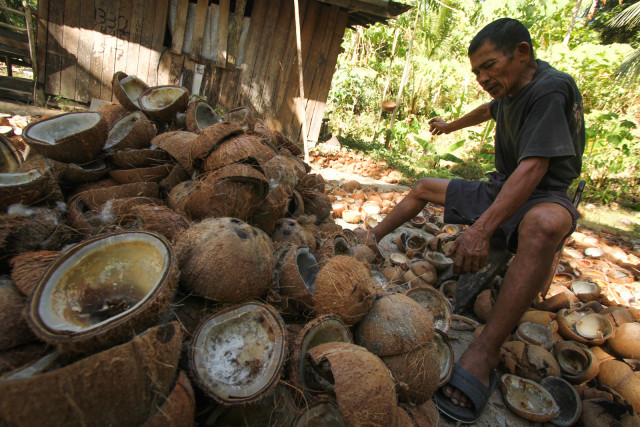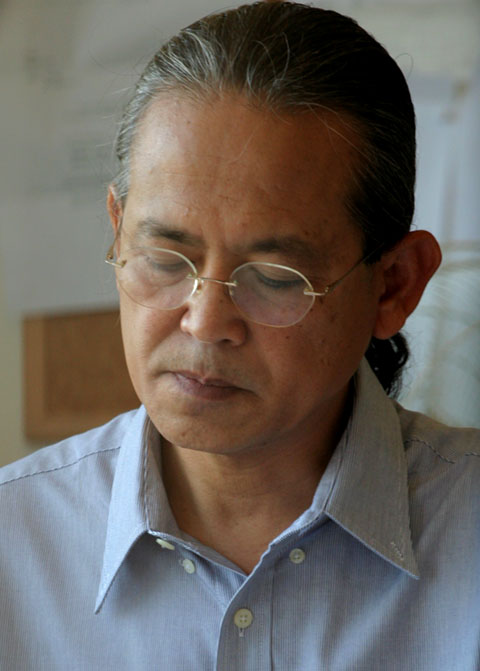DAVAO CITY (MindaNews / 8 Nov) – A portion of the P75-billion coco levy fund will be allocated for research and development, Philippine Coconut Authority (PCA) administrator Romulo J. dela Rosa said.
 A coconut farmer Samal Island. Mindanews file photo
A coconut farmer Samal Island. Mindanews file photo
During the 2nd Cocolink at the SMX Convention Center Davao Tuesday, Dela Rosa said the research and development component would be integrated into the creation of Coconut Industry Development Roadmap once the proposed Coconut Industry Trust Fund will be legislated into law. The Lower House passed its own version last September 25.
Dela Rosa said the industry players themselves would develop the roadmap that will cover the entire coconut industry.
He said it would be needed to modernize the industry and increase the capabilities of farmers. The coco levy fund will also be utilized for the scholarship program of deserving children of the coconut farmers, he said.
Dela Rosa emphasized the need to modernize the coconut industry with farmers diversifying into other coconut-based products. He said this would have to mean lessening dependence on coconut oil.
“We should avoid single product dependence. Because of dependence on coconut oil as a single product, the Philippine coconut industry became very vulnerable to competition from cheaper vegetable oils. The development of other products and the resulting integration of factories has saved the industry from ruin,” he said.
 PCA Administrator Romulo J. dela Rosa.
PCA Administrator Romulo J. dela Rosa.
Dela Rosa said it is possible to multiply coconut yields up to four times by following good agricultural practices through fertilization, hybridization and irrigation.
“We pride ourselves in saying that our coconuts are produced in an organic way. Unfortunately, our coconuts are organic by neglect. Being a naturally resilient crop, coconuts produce even with little cultivation and care. So, our farmers do not undertake measures to return the fertility of the soil, apply varietal improvement and insure water supply,” he said.
Dela Rosa said the agency is eyeing to distribute 20 million coconut seedlings over the next three years through its massive replanting program in a bid to revitalize the coconut industry in the country.
Dela Rosa said they have to venture into massive replanting and fertilization efforts to increase the production capacity of the coconut farms to be able to close the supply shortfall.
He said the PCA has a proposed 2018 budget of P1.4 billion, at least half of which will be allocated for the replanting, most specifically in areas severely hit by typhoons and affected pests and diseases. For Mindanao, Basilan in the Autonomous Region in Muslim Mindanao (ARMM) will be a priority area, Dela Rosa said.
The agency will also strengthen its fertilization program in order to deliver immediate impact on maximizing the productivity of coconut farms across the country to ease the supply gap in the market, he said.
He said he is planning to suggest for realignment of the agency’s funds to fund its fertilization program.
“The more immediate thing that can be done – it takes three or four years before hybrids start to produce – the best way that will have immediate impact is fertilization. We have to improve fertilization… at farm level so we can increase the yield,” Dela Rosa said.
Currently, he said the coconut trees in the country could produce an average of 47 nuts a year, much lower compared to its maximum potential annual yield of 200 nuts per tree.
“We can increase if we undertake the necessary good agricultural practices that will have immediate impact to increase productivity of farmers,” he said.
Dela Rosa said the productivity must catch up with the industry demand as the manufacturers of coconut-based products face a tighter competition among themselves in the market for raw coconuts.
He also vouched support of the private sector to venture into coconut farming to boost the supply. (Antonio L. Colina IV / MindaNews)
